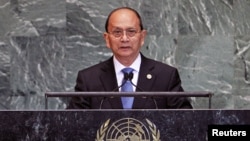UNITED NATIONS —
Burma's president said his country is on an irreversible path toward democracy and is ushering in a new era as a member of the family of nations.
Thein Sein, a former general-turned-civilian, was sworn in as Burma's president just 18 months ago, and said he is guiding his country away from its authoritarian past towards democracy.
Most recently, his actions have been rewarded with Secretary of State Hillary Clinton’s announcement that Washington would begin easing the decade-old restrictions on the import of Burmese products into the United States.
"And in recognition of the continued progress toward reform and in response to requests from both the government and the opposition, the United States is taking the next step in normalizing our commercial relationship," said Clinton.
At the United Nations Thursday, President Thein Sein alluded to international sanctions.
“Myanmar should be viewed from a different and new perspective," he said. "It is also necessary for us to be able to work in more conducive and favorable environment than ever before.”
Myanmar is the other name by which Burma is known.
Thein Sein listed his government’s accomplishments, including freeing hundreds of political prisoners, holding free and fair elections and ending restrictions on the media and allowing access to the Internet.
He said equally important to his government’s efforts to implement political and economic reform have been attempts to reconcile conflicts with the country’s many ethnic groups.
“We have so far achieved cease-fire agreements with 10 armed groups, while further strengthening confidence-building measures we will continue the peace talks," Sein said. "National-level peace negotiations will then continue toward a final peace agreement that would completely end the armed hostilities.”
Burma's president also acknowledged recent violence in the western Rakhine state between Rakhine Buddhists and minority Rohingya Muslims that has claimed nearly a hundred lives. He said all people in Burma have a right to live in peace and security. He said a commission made up of Christians, Buddhists, Muslims and Hindus is investigating the events and would submit their findings and recommendations to him.
The president’s New York trip coincides with a 17-day tour of the United States by opposition leader Aung San Suu Kyi, who is now a member of Burma’s parliament.
While some have said the democracy icon’s visit would deflect attention from Thein Sein’s U.N. debut, he did not seem to mind, congratulating her on her work and the recognition she has received for promoting democracy.
Thein Sein, a former general-turned-civilian, was sworn in as Burma's president just 18 months ago, and said he is guiding his country away from its authoritarian past towards democracy.
Most recently, his actions have been rewarded with Secretary of State Hillary Clinton’s announcement that Washington would begin easing the decade-old restrictions on the import of Burmese products into the United States.
"And in recognition of the continued progress toward reform and in response to requests from both the government and the opposition, the United States is taking the next step in normalizing our commercial relationship," said Clinton.
At the United Nations Thursday, President Thein Sein alluded to international sanctions.
“Myanmar should be viewed from a different and new perspective," he said. "It is also necessary for us to be able to work in more conducive and favorable environment than ever before.”
Myanmar is the other name by which Burma is known.
Thein Sein listed his government’s accomplishments, including freeing hundreds of political prisoners, holding free and fair elections and ending restrictions on the media and allowing access to the Internet.
He said equally important to his government’s efforts to implement political and economic reform have been attempts to reconcile conflicts with the country’s many ethnic groups.
“We have so far achieved cease-fire agreements with 10 armed groups, while further strengthening confidence-building measures we will continue the peace talks," Sein said. "National-level peace negotiations will then continue toward a final peace agreement that would completely end the armed hostilities.”
Burma's president also acknowledged recent violence in the western Rakhine state between Rakhine Buddhists and minority Rohingya Muslims that has claimed nearly a hundred lives. He said all people in Burma have a right to live in peace and security. He said a commission made up of Christians, Buddhists, Muslims and Hindus is investigating the events and would submit their findings and recommendations to him.
The president’s New York trip coincides with a 17-day tour of the United States by opposition leader Aung San Suu Kyi, who is now a member of Burma’s parliament.
While some have said the democracy icon’s visit would deflect attention from Thein Sein’s U.N. debut, he did not seem to mind, congratulating her on her work and the recognition she has received for promoting democracy.




